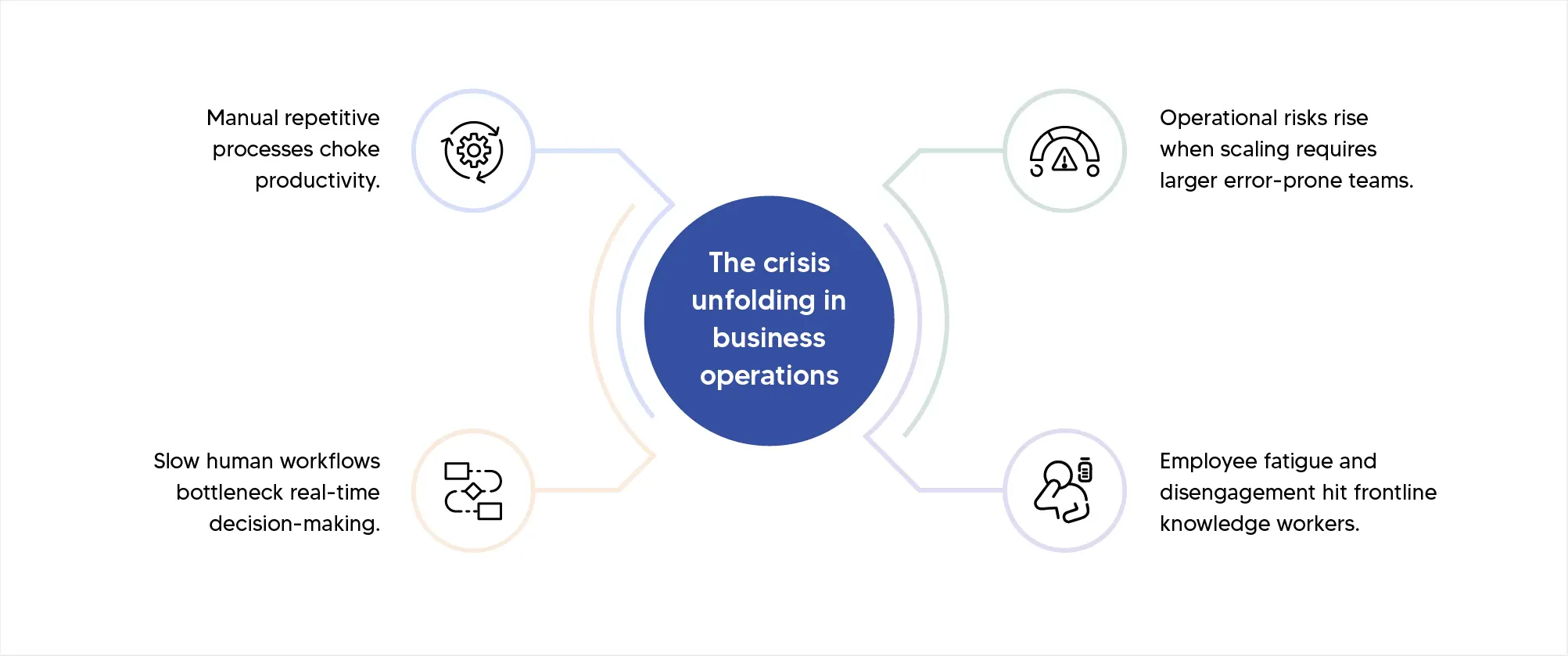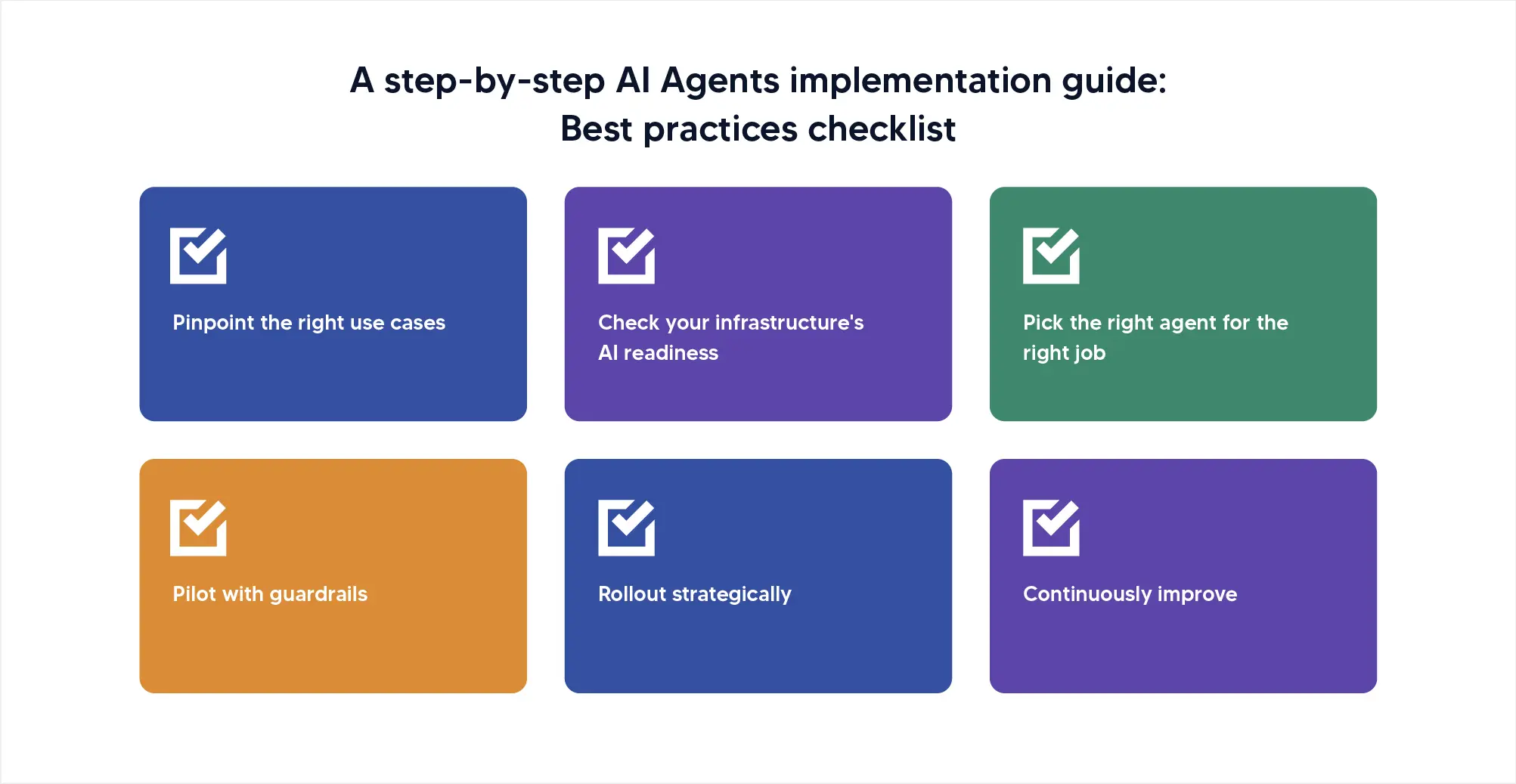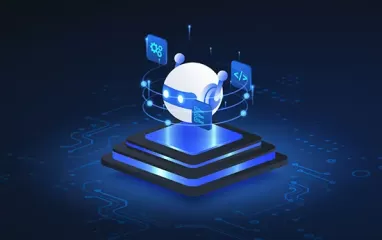Other recent blogs


Let's talk
Reach out, we'd love to hear from you!
We’re halfway through 2025, and the latest breakthrough - AI agents are already taking over the business automation landscape. With global investments in AI agents projected to surpass $47 billion by 2030, enterprises are adamant about using AI agents in 2025 to optimize productivity quotients, streamline day-to-day business operations, and improve customer interactions. The numbers reflect a compelling story about the massive shift taking place in boardrooms across the globe.
The reason is simple: traditional business processes are unable to keep pace with today’s operational speed demands, and AI agents are smartly filling that gap without human supervision. Whether handling core enterprise operations, making decisions in real time, managing fragmented workflows, or interacting with customers, intelligent AI agents handle everything through autonomous task execution with contextual awareness and greater precision.
If you are wondering why AI agents are the next frontiers of intelligent business automation in 2025 and beyond, this guide explores their transformative potential in changing the way CEOs manage their existing processes independently as collaborative partners. Also, you will get a deep dive into a proven implementation strategy for deploying AI agents to power smart business automation in 2025 with confidence.
Why businesses need smart AI-powered business automation— and how AI Agents make it happen?
Let’s be honest: In today's AI-centered era, business processes are bloated due to sluggish document approvals, reactive customer service, and inefficiencies that drag down margins and frustrate talent. Without smart business process automation, companies are at high risk of operational challenges. Traditional manual processes put too much pressure on an organization's precious resources by letting people spend countless hours on repetitive tasks.

Smart automation powered by AI agents reduces these pressures by handling work in real-time and flagging exceptions for human review when necessary. AI Agents quietly bridge the widening gap between human potential and machine precision, while eliminating all bottlenecks that slow decision-making and increase error rates.
With the timely adoption of AI agents, companies amplify strategic decision-making by balancing a synergy between humans (for high-value tasks) and technology (for heavy lifting), leading to increased productivity and less employee burnout. The magic happens when AI agents step in with contextual decision-making and push traditional rule-based execution out of the room. Putting intelligent systems at work means fast data processing, better learning from feedback, and adjusting decisions based on evolving scenarios.
A step-by-step AI Agents implementation guide: Best practices checklist

1. Pinpoint the right use cases
Success begins with the strategic identification of automation opportunities. Start by analyzing your current processes and identifying repetitive, rule-based tasks that consume significant time. Look for areas where human error occurs frequently or where delays impact customer satisfaction.
Focus on processes with clear inputs and outputs. Customer service inquiries, data entry, invoice processing, and report generation often represent excellent starting points. Evaluate each potential use case based on impact, feasibility, and alignment with business objectives.
Document current workflows thoroughly before implementing AI agents. Understanding the existing process helps identify optimization opportunities and ensures smooth integration. Create clear success metrics that align with business outcomes rather than just operational efficiency.
2. Check your infrastructure's AI readiness
Evaluate your current technology stack to ensure it can support AI agent deployment. Modern AI agents require robust computing resources, reliable internet connectivity, and secure data storage systems. Cloud infrastructure often provides the scalability and flexibility needed for successful implementation.
Data quality forms the foundation of effective AI agent performance. Clean, organized, and accessible data enables agents to make accurate decisions and provide valuable insights. Invest in data governance practices that ensure consistency and reliability across all information sources.
Security considerations become paramount when implementing AI agents. These systems often access sensitive business information and interact with critical systems. Implement strong authentication, encryption, and access controls to protect your organization and customer data.
3. Pick the right agent for the right job
Matching AI agent capabilities to specific business needs requires careful analysis. Simple reflex agents work well for straightforward tasks, while complex business processes benefit from learning agents or hierarchical systems. Consider the decision-making complexity, data requirements, and integration needs for each use case.
Evaluate different AI agent platforms based on their strengths, limitations, and compatibility with your existing systems. Some excel at natural language processing, while others specialize in predictive analytics or process automation. Choose solutions that align with your technical capabilities and business objectives.
Consider hybrid approaches that combine multiple agent types for comprehensive automation. A hierarchical system might use simple reflex agents for routine tasks while employing learning agents for complex decision-making processes.
4. Pilot with guardrails
Start small with carefully controlled pilot programs that test AI agent capabilities without risking critical business operations. Select low-risk, high-impact use cases that demonstrate value while allowing for learning and adjustment.
Implement robust monitoring and control mechanisms during pilot phases. Human oversight remains essential during initial deployment, ensuring agents perform as expected and identifying areas for improvement. Set clear boundaries and escalation procedures for situations that require human intervention.
Establish feedback loops that capture both quantitative performance metrics and qualitative user experiences. Regular evaluation during pilot phases helps identify issues early and guides optimization efforts before full-scale deployment.
5. Rollout strategically
Gradual expansion minimizes risks while maximizing learning opportunities. Phase your rollout to allow for system optimization and user training between each stage. Start with departments or processes that demonstrated success during pilot phases.
Change management becomes crucial during rollout phases. Employees need training, support, and clear communication about how AI agents will impact their roles. Focus on augmentation rather than replacement, emphasizing how agents enhance human capabilities.
Monitor performance continuously during rollout, using real-time dashboards and regular reviews to track progress. Be prepared to adjust strategies based on performance data and user feedback. Flexibility during implementation often determines long-term success.
6. Continuously improve
AI agents thrive on continuous optimization and learning. Review performance metrics, user feedback, and business outcomes regularly to identify improvement opportunities. Update agent parameters, expand capabilities, and refine processes based on real-world experience.
Stay current with advancing AI technologies and update your agents accordingly. The field evolves rapidly, and new capabilities emerge regularly. Maintaining a competitive advantage requires ongoing investment in system improvements and capability expansion.
Foster a culture of innovation where employees contribute ideas for new automation opportunities. The most successful AI agent implementations leverage human creativity and domain expertise to identify novel applications and optimization strategies.
What’s next: Future AI Agent trends defining 2025

Trend 1: Hyperautomation
Hyperautomation represents the convergence of multiple automation technologies into comprehensive business transformation platforms. This strategy unlocks the AI agents associated with robotic process automation, machine learning, and sophisticated analytics to produce end-to-end automated business processes. Hyperautomation programs in organizations result in greater integration of systems with processes. AI agents are transformed to be orchestrators that coordinate different automation tools to provide smooth flows within an entire business function.
Trend 2: Edge AI
Edge AI moves intelligence to the locations of data production, making it possible to make decisions in real-time without operating on the cloud. The edge AI is implemented on the agents that manage information locally, shortening latency and providing better reaction times to critical business processes. The trend plays a particular advantage to the manufacturing, retail, and logistics industries, where direct actions influence crucial operations in terms of operational effectiveness. In reaction to any changing conditions, Edge AI agents are in a position to respond in real-time, optimizing processes real-time.
Trend 3: AI-Augmented workforce
The future workplace features seamless collaboration between human workers and AI agents. Instead of substitution, these intelligent systems enhance the capabilities of employees, doing all the routine work so that people can engage in creative and strategic work. AI agents appear as effective associates, giving advice, issuing insights, and surely assisting in making complicated choices. This collaborative design makes the best use of human and artificial intelligence.
Trend 4: Conversational AI
The use of natural language interfaces can increase the user friendliness of AI agents to ordinary users. Conversational AI allows an employee to speak with automation systems or speak in a conversational tone without the necessity of having technical knowledge about that system. It is a democratizing of access to intelligent automation where more of our employees can draw the capabilities of AI agents. Complex systems are made easy to operate with voice-activated interfaces as well as chatbot-based interactions.
Trend 5: No-Code/Low-Code Platforms
Simplified development platforms enable business users to create and customize AI agents without extensive programming knowledge. These platforms provide visual interfaces and pre-built components that accelerate deployment and reduce technical barriers. No-code/ low-code approaches expand the potential user base for AI agents, allowing domain experts to create specialized automation solutions without relying on IT departments.
Why do custom AI agents in business automation matter and outperform off-the-shelf?

Custom AI agent solutions are a great way to address the unique challenges and opportunities within your specific business environment. Contrary to generic automation tools, custom agents can fit easily into current systems, workflows, and organizational culture. Remarkably, they are also customized to promote intelligent digital assistants, built deeply within the daily business needs, as they offer more accurate and useful automation features.
Still not sure whether to invest in a custom solution or opt for a pre-built AI agent? We've covered this in detail—read our blog Build vs. Buy in Agentic AI to help you decide.
The following are some of the most notable capabilities and business benefits that any custom AI Agent can provide:
1. Security and compliance excellence
Enterprise-grade security capabilities such as Role-Based Access Control (RBAC), advanced identity and access management, or high-security data privacy safeguards are adopted in Custom AI agents. They result in regulatory compliance and audit logging and real-time monitoring. Its security architecture can adapt around your chosen risk profile, regulatory needs and compliance frameworks, which is essential since generic solutions are frequently too rigid to serve an industry-specific security.
2. Tailored business integration
Custom solutions offer a direct fit to your needs, become compatible with the current databases, programs, and processes without major interference with established procedures. Such a customized strategy disrupts as little as possible and yields the highest returns of automation. They know the language of your industry, what your regulatory requirements are, and who your competitors are and they streamline processes based on what your strategic plans are instead of automating a process following a generic pattern that may not conform to your business logic.
3. Centralized information management
Custom AI agents deliver single data ecosystems that remove data silos and offer similar access to vital business information that is cross-departmental and cross-systems. Such an integrated strategy provides cross-functional insight and decision-making that is impossible on fragmented systems. AI agents are able to connect data across departments, find opportunities and risks that might occur across organizational boundaries, and preserve data integrity and access control.
4. Advanced Process Automation
These solutions automate complex, and multi-step business processes that stipulate generic tools, which adapt to your very workflows, decision-making hierarchies and exception handling processes. Customization is also applied to business logic and approval workflows as well as integration points. These agents do not simply respond using predetermined rules they also comprehend your business scenario and make decisions that maintain your business strategic goals and they have to address edge cases peculiar to your business operations.
5. Multi-channel communication excellence
Custom AI agents can provide the notifications, updates, and insights in the diverse communication channels and so the critical information can reach the right person through the preferred ways of communicating such as email, SMS, Slack, Microsoft Teams, and mobile applications. Communication strategy changes according to the user preferences, the urgency and organizational hierarchies. High-priority warnings are broadcast to decision-makers in real time and more routine statuses are buffered and summarized based on personal preferences and departmental processes.
6. Conversational analytics interface
Natural language interfaces allow for on-demand reporting and intelligent provisions through natural conversations, where workers can pose questions about business data, demand evaluation, and get actionable intelligence without any technical education. Such democratization of business intelligence changes the way organizations access and use data. Complicated analytics are presented to non-technical users and still carry the levels of sophistication essential in strategic decision-making, which closes the data science and business operations gap.
7. Autonomous operation with strategic oversight
Custom AI agents work autonomously within well-established parameters and make decisions, as well as actions, without always being under human supervision and manage routine activities effectively and escalating complex cases to predetermined destinations. The degree of autonomy varies according to your tolerance level and needs of operations. Only important decisions may be made by people and other common tasks happened automatically and maximize efficiency without giving up control over big business activities.
8. Cognitive reasoning and decision quality
Advanced capability of reasoning will allow custom AI agents to compute complex situations, consider various variables and make important actions that support business goals. The reasoning model takes into consideration your business rules, risk preferences and your strategic priorities. This will make sure that agent decisions will be such that will aid organization objectives, as opposed to mere optimization of personal measures, and where decisions are to be made considering options available, and choosing the best course of action, weighing short-term efficiency, and long-term strategic potential.
9. Goal-oriented action and strategic alignment
Custom agents work toward specific business outcomes, planning their activities to achieve desired results while understanding how their actions contribute to broader organizational objectives. The goal-oriented behavior extends beyond task completion to strategic contribution. AI agents become partners in achieving business outcomes rather than simply automated task executors, optimizing their approach based on changing conditions, priorities, and strategic initiatives across the organization.
10. Adaptive learning and continuous improvement
These systems continuously improve their performance through experience, learning from both successes and failures to enhance future decision-making capabilities within your specific business environment. The learning process adapts to your operational requirements and strategic objectives. The adaptation mechanism ensures that agents evolve with your business, incorporating new insights, changing priorities, and emerging opportunities into their decision-making frameworks while maintaining alignment with organizational culture and values.
Final Word: AI Agents in 2025 are the backbone of smart business automation
If there’s a single operational shift worth prioritizing in 2025, it’s deploying AI agents for smart business automation. Done right, they unlock faster decision-making, operational resilience, and scalable growth. The playbook is clear — start small, pick your use cases wisely, test hard, and improve continuously. Avoid the off-the-shelf shortcut. Invest in custom AI agent solutions that align with your infrastructure, data governance, and operational goals.
The strategic implementation of custom AI agents for smart business automation represents a transformative opportunity for forward-thinking organizations. Success depends clearly on careful planning, thoughtful execution, and continuous optimization that aligns with business objectives.
Ready to transform your business operations with custom AI agents? At Kellton, we help businesses design, deploy, and optimize custom AI agent systems that deliver real, and measurable impact. From security-hardened automation to AI-augmented workflows, our AI solutions aren’t just future-proof — they’re operationally transformative.
Let’s build something intelligent together. Contact Kellton today to explore how custom AI agents can revolutionize your business automation strategy. We are happy to help you build the intelligent infrastructure that will power your organization's future success.




